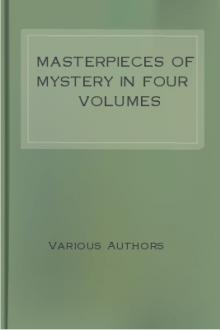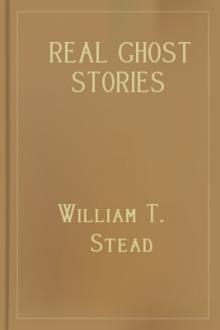Varney the Vampire; Or, the Feast of Blood by Prest and Rymer (ereader iphone .txt) 📗

- Author: Prest and Rymer
Book online «Varney the Vampire; Or, the Feast of Blood by Prest and Rymer (ereader iphone .txt) 📗». Author Prest and Rymer
Mobs do not reason very closely and clearly; but the very fact of the frantic flight of Sir Francis Varney from the projected attack of the infuriated multitude, was seized hold of as proof positive of the reality of his vampyre-like existence.
Then, again, had he not disappeared in the most mysterious manner? Had he not sought refuge where no human being would think of seeking refuge, namely, in that old, dilapidated ruin, where, when his pursuers were so close upon his track, he had succeeded in eluding their grasp with a facility which looked as if he had vanished into thin air, or as if the very earth had opened to receive him bodily within its cold embraces?
It is not to be wondered at, that the few who fled so precipitately from the ruin, lost nothing of the wonderful story they had to tell, in the carrying it from that place to the town. When they reached their neighbours, they not only told what had really occurred, but they added to it all their own surmises, and the fanciful creation of all their own fears, so that before mid-day, and about the time when Henry Bannerworth was conversing so quietly in the gardens of the Hall with his beautiful sister, there was an amount of popular ferment in the town, of which they had no conception.
All business was suspended, and many persons, now that once the idea had been started concerning the possibility that a vampyre might have been visiting some of the houses in the place, told how, in the dead of the night, they had heard strange noises. How children had shrieked from no apparent cause—doors opened and shut without human agency; and windows rattled that never had been known to rattle before.
Some, too, went so far as to declare that they had been awakened out of their sleep by noises incidental to an effort made to enter their chambers; and others had seen dusky forms of gigantic proportions outside their windows, tampering with their fastenings, and only disappearing when the light of day mocked all attempts at concealment.
These tales flew from mouth to mouth, and all listened to them with such an eager interest, that none thought it worth while to challenge their inconsistencies, or to express a doubt of their truth, because they had not been mentioned before.
The only individual, and he was a remarkably clever man, who made the slightest remark upon the subject of a practical character, hazarded a suggestion that made confusion worse confounded.
He knew something of vampyres. He had travelled abroad, and had heard of them in Germany, as well as in the east, and, to a crowd of wondering and aghast listeners, he said,—
"You may depend upon it, my friends, this has been going on for some time; there have been several mysterious and sudden deaths in the town lately; people have wasted away and died nobody knew how or wherefore."
"Yes—yes," said everybody.
"There was Miles, the butcher; you know how fat he was, and then how fat he wasn't."
A general assent was given to the proposition; and then, elevating one arm in an oratorical manner, the clever fellow continued,—
"I have not a doubt that Miles, the butcher, and every one else who has died suddenly lately, have been victims of the vampyre; and what's more, they'll all be vampyres, and come and suck other people's blood, till at last the whole town will be a town of vampyres."
"But what's to be done?" cried one, who trembled so excessively that he could scarcely stand under his apprehension.
"There is but one plan—Sir Francis Varney must be found, and put out of the world in such a manner that he can't come back to it again; and all those who are dead that we have any suspicion of, should be taken up out of their graves and looked at, to see if they're rotting or not; if they are it's all right; but, if they look fresh and much, as usual, you may depend they're vampyres, and no mistake."
This was a terrific suggestion thrown amongst a mob. To have caught Sir Francis Varney and immolated him at the shrine of popular fury, they would not have shrunk from; but a desecration of the graves of those whom they had known in life was a matter which, however much it had to recommend it, even the boldest stood aghast at, and felt some qualms of irresolution.
There are many ideas, however, which, like the first plunge into a cold bath, are rather uncomfortable for the moment; but which, in a little time, we become so familiarized with, that they become stripped of their disagreeable concomitants, and appear quite pleasing and natural.
So it was with this notion of exhuming the dead bodies of those townspeople who had recently died from what was called a decay of nature, and such other failures of vitality as bore not the tangible name of any understood disease.
From mouth to mouth the awful suggestion spread like wildfire, until at last it grew into such a shape that it almost seemed to become a duty, at all events, to have up Miles the butcher, and see how he looked.
There is, too, about human nature a natural craving curiosity concerning everything connected with the dead. There is not a man of education or of intellectual endowment who would not travel many miles to look upon the exhumation of the remains of some one famous in his time, whether for his vices, his virtues, his knowledge, his talents, or his heroism; and, if this feeling exist in the minds of the educated and refined in a sublimated shape, which lends to it grace and dignity, we may look for it among the vulgar and the ignorant, taking only a grosser and meaner form, in accordance with their habits of thought. The rude materials, of which the highest and noblest feelings of educated minds are formed, will be found amongst the most grovelling and base; and so this vulgar curiosity, which, combined with other feelings, prompted an ignorant and illiterate mob to exhume Miles, the once fat butcher, in a different form tempted the philosophic Hamlet to moralise upon the skull of Yorick.
And it was wonderful to see how, when these people had made up their minds to carry out the singularly interesting, but, at the same, fearful, suggestion, they assumed to themselves a great virtue in so doing—told each other what an absolute necessity there was, for the public good, that it should be done; and then, with loud shouts and cries concerning the vampyre, they proceeded in a body to the village churchyard, where had been lain, with a hope of reposing in peace, the bones of their ancestors.
A species of savage ferocity now appeared to have seized upon the crowd, and the people, in making up their minds to do something which was strikingly at variance with all their preconceived notions of right and wrong, appeared to feel that it was necessary, in order that they might be consistent, to cast off many of the decencies of life, and to become riotous and reckless.
As they proceeded towards the graveyard, they amused themselves by breaking the windows of the tax-gatherers, and doing what passing mischief they could to the habitations of all who held any official situation or authority.
This was something like a proclamation of war against those who might think it their duty to interfere with the lawless proceedings of an ignorant multitude. A public-house or two, likewise, en route, was sacked of some of its inebriating contents, so that, what with the madness of intoxication, and the general excitement consequent upon the very nature of the business which took them to the churchyard, a more wild and infuriated multitude than that which paused at two iron gates which led into the sanctuary of that church could not be imagined.
Those who have never seen a mob placed in such a situation as to have cast off all moral restraint whatever, at the same time that it feels there is no physical power to cope with it, can form no notion of the mass of terrible passions which lie slumbering under what, in ordinary cases, have appeared harmless bosoms, but which now run riot, and overcame every principle of restraint. It is a melancholy fact, but, nevertheless, a fact, despite its melancholy, that, even in a civilised country like this, with a generally well-educated population, nothing but a well-organised physical force keeps down, from the commission of the most outrageous offences, hundreds and thousands of persons.
We have said that the mob paused at the iron gates of the churchyard, but it was more a pause of surprise than one of vacillation, because they saw that those iron





Comments (0)